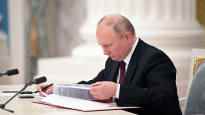Even if Putin had so far managed to assess the price of sanctions and found it tolerable, the price of an open war would be much more unpredictable, writes ‘s foreign journalist Mika Mäkeläinen.
The hot question for Europe right now is what the Russian president is doing Vladimir Putin will do next?
If we can count on Putin to still make sensible decisions from his own point of view, it means assessing the pros and cons: What could Russia achieve with what action and how hard would it have to pay?
The first and now already lost option would have been for Putin not to take any more risks. The mere recognition of the puppet states of Donetsk and Luhansk as independent would have provided an opportunity for Putin to ease by withdrawing troops from the Ukrainian border.
Without losing face, Putin could have shown the Russians that Russia had brought about some change.
However, it would have been difficult to see any concrete benefit from this, because with the recognition of independence, Russia lost its leverage in Ukraine, ie the opportunity to influence Ukraine’s internal affairs through the Minsk agreement.
Therefore, it is not surprisingthat Putin has already decided on the second and most radical step. Russia has sent its soldiers disguised as “peacekeepers” to the puppet states of eastern Ukraine.
Russia has been waiting for sanctions and does not seem to be afraid of them. Russian Ambassador to Sweden Viktor Tatarintsev in the second week, Russia predicted that Russia would not care about “shit” economic sanctions.
The effectiveness of economic sanctions is also diluted by Russia’s vast foreign exchange reserves.
Russia can therefore consider the cost of its “peacekeeping operation” to be tolerable. At the same time, however, it is difficult to see what benefits Russia sees in hosting the deprived regions of Donetsk and Luhansk.
Putin could script the plot in the future, with Russian vassals Donetsk and Luhansk asking to join Russia. A small strip of Donbass still does not bring at least economic benefits to Russia.
A third, even more dangerous path starts from what Russia considers to belong to the puppet states of Donetsk and Luhansk, that is, what area can be controlled by Russian peacekeepers. It is still unclear.
About two-thirds of the Donetsk and Luhansk provinces are under the control of the Ukrainian government, but Russia also believes that the region may belong to the “independent” states.
The interpretation threatens to lead the Russian and Ukrainian armed forces directly into confrontation – if Russia so wishes.
Even if Putin had so far succeeded in estimating the price of sanctions, the price of an open war would be far more unpredictable. Putin’s calculations are beginning to become very uncertain.
However, all this has so far been mainly related to eastern Ukraine.
Putin’s exceptionally bitter speech Monday night unfortunately suggests that Russia may have more than just eastern Ukraine in sight.
In his speech, Putin questioned the independence of the entire Ukrainian state. According to Putin, Ukraine has historically belonged to Russia and Putin still does not consider it truly independent, but only a vassal of the West.
Why would Russia do that? Russia always has its nuclear weapon, so it’s hard to imagine Putin really seeing a fatal outside threat in the United States, NATO, or Ukraine.
Because of the threat to democracy, Russia could try to make Ukraine a failed state at almost any cost.
According to Russian researchers, diplomacy is no longer enough to combat the threat, but the West must strengthen Ukraine’s armed forces – that is, raise the cost of fighting to Russia.
Indicates Russian choices can be found not only in Putin’s speech but also in the earlier stages of the war in Ukraine.
One thing Russia has learned from the history of recent years is that Western countries have poor pain tolerance and tournament endurance. Democracies are comfortable.
Russia stole Crimea from Ukraine eight years ago and set fire to eastern Ukraine. At the time, Western sanctions were quite limited – and oil prices were rising has compensated (switch to another service) revenue foregone due to sanctions.
So Putin has learned that the West has not been able to take a common front or make tough and far-reaching decisions, so he can take ever-increasing risks more safely.
That is why Europe is being asked to take action on very difficult countermeasures if we do not want Russia to redraw its borders.
